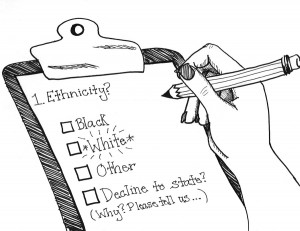Race still a factor in job searches
Meet Yolanda Spivey: a vibrant and educated young woman in her 20s with more than a decade of experience in the insurance industry. During those that span, she worked as an assessor, broker and manager of other employees. She did well in her field too, with a client base including not just individuals but also small businesses and commercial enterprises.
This was all until she lost her job in late 2009.
Despite this, one would think that a woman with her resume and experience would be quick to pick up a new job, even in a market as tipsy as the insurance industry in 2009.
Yet she didn’t. According to a personal essay on Techyville.com, she continued being unemployed for more than two years after her layoff. In total, Spivey applied for more than 300 jobs in her industry. Each of the more than 300 jobs she applied for considered her an unsuitable fit for the job posted.
So Spivey elected to do something different one week. Instead of using her name when she went through her weekly application spring, she created an alter ego of sorts under the pseudonym “Bianca White.” The resume and work experience for White and Spivey were identical, as was the contact information, education and history. White and Spivey were identical on paper insofar as one difference: Their races.
Monster.com, the resource Spivey had been using to apply for jobs, has a diversity questionnaire that users are required to fill out. When she originally created her Monster.com profile, Spivey answered that she is black. After hearing no response for so long, she decided to change her response on the questionnaire from “Black” to “Decline to state.” This change made no difference in the (lack) of responses to her application. However, she listed her alter-ego as being “White” on the questionnaire.
Monster.com says that the questionnaire has no connection to job selection, and is purely for informational purposes only.
Nevertheless, in the week that “Bianca” applied for jobs in the insurance industry, she received exactly nine phone calls and seven emails with job offers. On the other hand, Spivey — who has exactly the same credentials, experience and education as the white Bianca — received zero phone calls and only two emails, each of which was for a commission-only job that demanded she move out of state.
The results speak for themselves: It is apparently easier to get a job if you are white than if you are black. Statistics support with this sentiment. According to the Bureau of Labor Statistics, the March 2013 white unemployment rate was 6.7 percent. In contrast, black unemployment rate is slightly less than double that, reading at 13.3 percent. The same trend is reflected among youth (defined as ages 16-19), who traditionally are employed at lower rates than their older counterparts. The March numbers for white youth unemployment read 22.5 percent. The unemployment rate for black youth is 33.8 percent.
Even though this issue isn’t as black and white as these statistics, the numbers are still troubling to see.
Academic studies confirm that this gap is indeed more than just a mistake of statistics. For example, a study published in 2009 by Devah Pager, a professor of sociology at Princeton University, found that “a young black man with a clean record does no better in his search for low wage work than a white man with a felony conviction.”
Discrimination in the workforce is nothing new for those who have to live with it. Many of the commenters on Spivey’s original article, posted on Techyville.com and Clutch Online Magazine, recall having similar experiences. Others even have conducted the same “experiment” themselves, with similar outcomes.
Spivey’s experiment provides something important that we can all take away: Workforce discrimination still exists in post-civil rights movement America. High unemployment of any group is not good for the country as a whole, as that represents a body of disengaged citizens that share common challenges in finding work. One can only wonder what the economic outlook for the United States would be like if all Americans were given equal employment opportunity.
Matthew Tinoco is a freshman majoring in print and digital journalism and comparative literature. His column “Mixing Colors” runs on Mondays.


I’m white…applied to 6 jobs a month ago. No calls for interviews on any of them.
Has the thought of you not having the necessary qualifications ever crossed your mind? It should have.